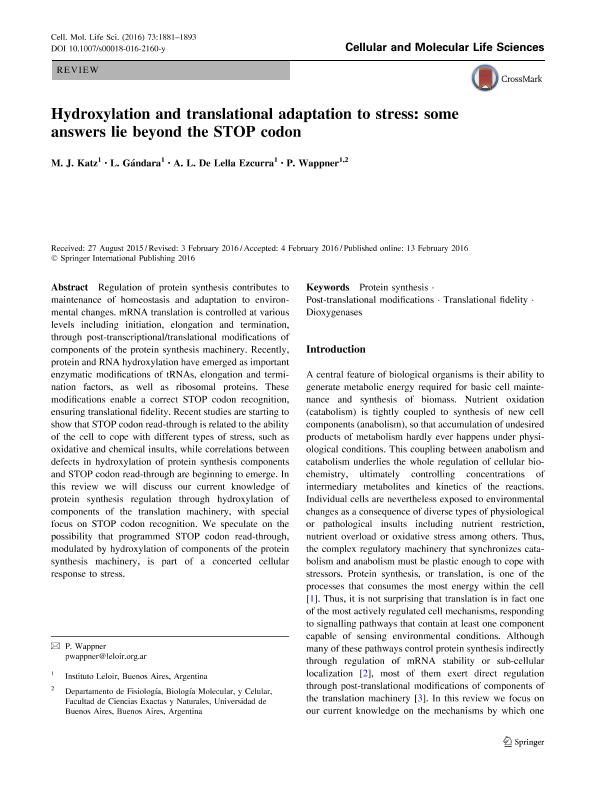Artículo
Hydroxylation and translational adaptation to stress: some answers lie beyond the STOP codon
Fecha de publicación:
02/2016
Editorial:
Springer
Revista:
Cellular And Molecular Life Sciences
ISSN:
1420-682X
e-ISSN:
1420-9071
Idioma:
Inglés
Tipo de recurso:
Artículo publicado
Clasificación temática:
Resumen
Regulation of protein synthesis contributes to maintenance of homeostasis and adaptation to environmental changes. mRNA translation is controlled at various levels including initiation, elongation and termination, through post-transcriptional/translational modifications of components of the protein synthesis machinery. Recently, protein and RNA hydroxylation have emerged as important enzymatic modifications of tRNAs, elongation and termination factors, as well as ribosomal proteins. These modifications enable a correct STOP codon recognition, ensuring translational fidelity. Recent studies are starting to show that STOP codon read-through is related to the ability of the cell to cope with different types of stress, such as oxidative and chemical insults, while correlations between defects in hydroxylation of protein synthesis components and STOP codon read-through are beginning to emerge. In this review we will discuss our current knowledge of protein synthesis regulation through hydroxylation of components of the translation machinery, with special focus on STOP codon recognition. We speculate on the possibility that programmed STOP codon read-through, modulated by hydroxylation of components of the protein synthesis machinery, is part of a concerted cellular response to stress.
Archivos asociados
Licencia
Identificadores
Colecciones
Articulos(IIBBA)
Articulos de INST.DE INVEST.BIOQUIMICAS DE BS.AS(I)
Articulos de INST.DE INVEST.BIOQUIMICAS DE BS.AS(I)
Citación
Katz, Maximiliano Javier; Gándara, Lautaro; de Lella Ezcurra, Ana Laura; Wappner, Pablo; Hydroxylation and translational adaptation to stress: some answers lie beyond the STOP codon; Springer; Cellular And Molecular Life Sciences; 73; 9; 2-2016; 1881-1893
Compartir
Altmétricas




